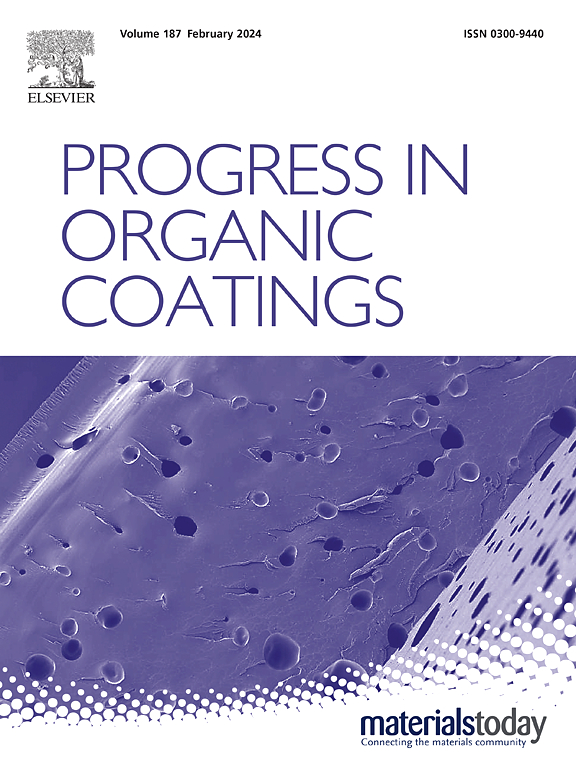Fabrication of anti-corrosion casting polyurethane coatings with high degree of microphase separation using colloidal BaFe12O19 quantum dots as filler
IF 7.3
2区 材料科学
Q1 CHEMISTRY, APPLIED
引用次数: 0
Abstract
Although the degree of microphase separation (DPS) is an important parameter of cast polyurethane (CPU), there are few studies have explored the relationship between DPS and corrosion resistance performance of CPU coatings. By using DMF-coordinated colloidal barium ferrite quantum dots (BFOQD) as filler, this research found that the BFOQD can act as reactive sites to efficiently extract and aggregate the hard segments, significantly reducing the mass fraction of the hard phase in the soft phase (Wh), thereby enhancing the DPS and crosslinking density (CLD) of PU, and resulting a good anti-corrosion performance of the CPU coating. This study confirmed the high efficiency of quantum dots in the field of corrosion resistance due to their large specific surface area and highly reactivity, and pointed out that the uniform distribution and avoidance of agglomeration is a vital concern when using them. A series of studies also conducted to explore an appropriate ratio between the hard segment content and the filler content to optimize the corrosion resistance performance. It is hoped that the findings can provide useful information for industrial productions and mechanism exploration in the development of new anti-corrosion coatings.
以胶体 BaFe12O19 量子点为填料制备具有高度微相分离的防腐浇注聚氨酯涂层
尽管微相分离度(DPS)是浇注聚氨酯(CPU)的一个重要参数,但很少有研究探讨 DPS 与 CPU 涂层耐腐蚀性能之间的关系。本研究通过使用 DMF 配位胶体钡铁氧体量子点(BFOQD)作为填料,发现 BFOQD 可作为反应位点高效提取和聚集硬段,显著降低软相(Wh)中硬相的质量分数,从而提高聚氨酯的 DPS 和交联密度(CLD),使 CPU 涂层具有良好的防腐蚀性能。这项研究证实了量子点因其大比表面积和高反应活性而在防腐蚀领域的高效性,并指出在使用量子点时,均匀分布和避免团聚是一个至关重要的问题。此外,还开展了一系列研究,探索硬段含量与填料含量之间的适当比例,以优化耐腐蚀性能。希望这些研究结果能为新型防腐涂料的工业生产和机理探索提供有用信息。
本文章由计算机程序翻译,如有差异,请以英文原文为准。
求助全文
约1分钟内获得全文
求助全文
来源期刊

Progress in Organic Coatings
工程技术-材料科学:膜
CiteScore
11.40
自引率
15.20%
发文量
577
审稿时长
48 days
期刊介绍:
The aim of this international journal is to analyse and publicise the progress and current state of knowledge in the field of organic coatings and related materials. The Editors and the Editorial Board members will solicit both review and research papers from academic and industrial scientists who are actively engaged in research and development or, in the case of review papers, have extensive experience in the subject to be reviewed. Unsolicited manuscripts will be accepted if they meet the journal''s requirements. The journal publishes papers dealing with such subjects as:
• Chemical, physical and technological properties of organic coatings and related materials
• Problems and methods of preparation, manufacture and application of these materials
• Performance, testing and analysis.
 求助内容:
求助内容: 应助结果提醒方式:
应助结果提醒方式:


